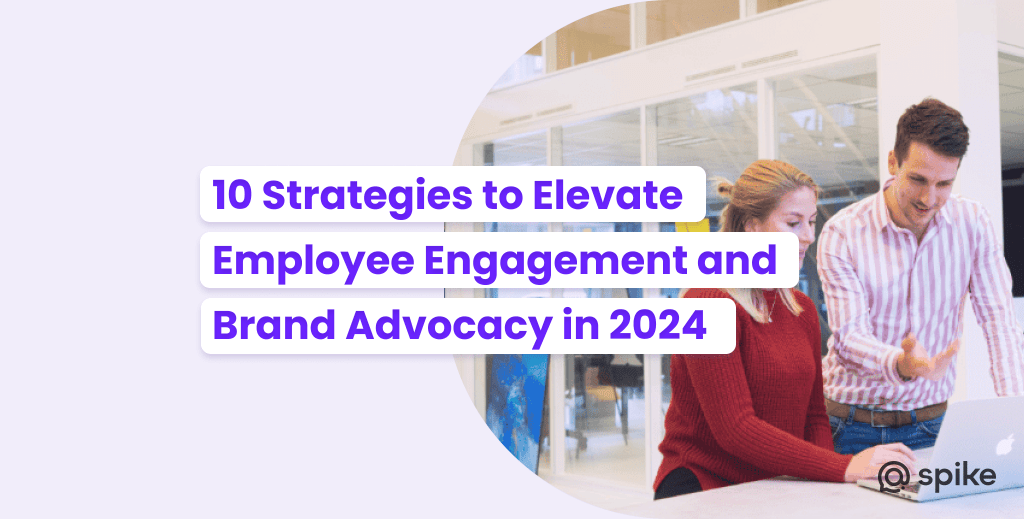10 Strategies for Employee Engagement and Brand Advocacy in 2024

The workplace of today is no longer confined to the physical office; it extends into virtual realms and remote settings, with an increasingly diverse and global workforce. Consequently, nurturing a cohesive company culture and ensuring employees feel valued and connected to the organization’s mission has never been more critical. Happy and engaged employees are more productive and become the most passionate advocates for the brand they represent. Their enthusiasm and commitment attract top talent and resonate with customers and partners, thus playing a pivotal role in shaping the organization’s reputation and market positioning.
Here, we explore ten strategic approaches that are particularly crucial in 2024 for enhancing employee engagement and brand advocacy. By leveraging the latest insights, technologies, and best practices, organizations can empower their workforce, foster a culture of continuous improvement, and harness the collective potential of their employees to drive success and innovation. Whether you are a business leader seeking to optimize your workforce strategies or an HR professional looking to enrich the employee experience, these strategies provide a roadmap to navigate the evolving work landscape in the years ahead.
Employee Engagement and Brand Advocacy Strategies
1. Prioritize Ongoing Employee Feedback
Employee feedback is the cornerstone of a thriving workplace. According to research, regular feedback can significantly reduce turnover rates, making it a powerful tool for retaining top talent. In 2024, organizations should take inspiration from this statistic and increase feedback frequency through weekly one-on-one meetings between managers and their direct reports. These regular check-ins offer opportunities for constructive feedback, recognition, and alignment of individual goals with organizational objectives.
Consider implementing a comprehensive communication and collaboration tool like Spike Teamspace to facilitate practical and effective ongoing feedback sessions and streamline the process.
2. Actively Seek Employee Feedback
Encouraging employees to share their opinions is vital for fostering engagement and shaping the employee experience. In 2024, organizations should use surveys to gather insights from their workforce. Employee surveys can encompass various topics, from engagement and onboarding experiences to diversity, equity, and inclusion. To maximize the impact, companies must send surveys and act on feedback, demonstrating their commitment to improvement.
To increase participation and make feedback collection more convenient, QR codes can be implemented. These codes link to the survey platform or specific link, allowing employees to access surveys on their mobile devices quickly.
3. Support Work-Life Balance
As millennials and Gen Z become the majority of the workforce, work-life balance remains a top priority. Offering flexible work arrangements and shorter workweeks can significantly enhance employee engagement. In 2024, HR teams should adopt policies integrating work-life balance into the company culture, providing employees the autonomy to manage their work schedules, reduce stress, and maintain a healthier balance between work and personal life.
4. Foster Transparency
Transparency builds trust and fosters engagement. While it may be challenging to be transparent about topics like compensation and professional development opportunities, it’s worth overcoming these challenges. In 2024, companies should strive to create a culture of transparency, ensuring employees understand the ‘why’ behind their work, which can help attract and retain top talent.
5. Set SMART Goals
Setting clear, Specific, Measurable, Achievable, Relevant, and Timely (SMART) goals is a proven method for enhancing employee engagement. By aligning individual and company goals, organizations can motivate employees by illustrating their contributions to the company’s success. In 2024, companies should embrace the SMART approach to goal-setting to provide clarity, motivation, and direction for their workforce.

6. Help Your Employees Thrive
Focusing on the well-being of employees is essential for engagement. Companies should offer professional development opportunities, encourage work-life balance, provide comprehensive healthcare plans, offer financial wellness resources, and promote initiatives that facilitate employee connections.
7. Encourage Employee Connections
With remote and hybrid work becoming more prevalent, it’s essential to facilitate opportunities for employees to connect. Mentorship programs, informal conversations, and regular check-ins can help build relationships and increase engagement.
8. Appreciate, Congratulate, and Celebrate
Recognition programs and expressions of appreciation can significantly boost morale and engagement. Recognizing employee contributions through personal thank-yous, shout-outs, or public acknowledgments in team channels can foster a positive work environment.
9. Invest in Engagement Solutions
To streamline engagement efforts, consider investing in modern employee engagement software. Look for features like recognition tools, customizable surveys, goal planning and tracking, digital collaboration spaces, analytics, and reporting capabilities to help your HR team efficiently manage and enhance engagement strategies.
10. Promote Employee Development and Learning
In 2024, continuous learning and development opportunities will be essential for employee engagement and brand advocacy. Encourage employees to enhance their skills and knowledge by offering access to training programs, workshops, and even resources like CompTIA A+ Practice Test, Microsoft DP-203 and Cisco Exam Dumps.
Invest in employee growth, and you will have a more skilled workforce and employees who feel valued and engaged, contributing positively to your organization’s culture and reputation. Make employee development a cornerstone of your engagement and advocacy strategy in the evolving workplace.
Wrap-Up on Enhancing Employee Engagement & Brand Advocacy

In conclusion, as businesses navigate the ever-changing workforce landscape in 2024, these strategies for employee engagement and brand advocacy will be instrumental in fostering a culture of excellence and driving organizational success. By prioritizing feedback, work-life balance, transparency, goal-setting, and employee well-being, companies can empower their workforce to become enthusiastic brand advocates and drive positive organizational change.




